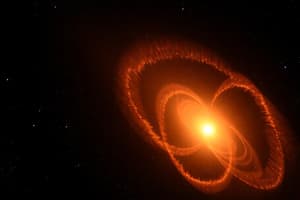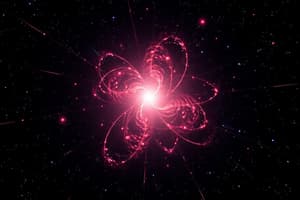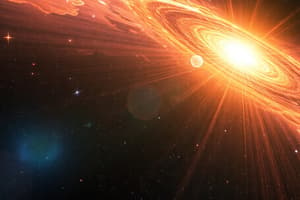Podcast
Questions and Answers
In which year did Jocelyn Bell Burnell observe her first pulsar?
In which year did Jocelyn Bell Burnell observe her first pulsar?
- 1970
- 1967 (correct)
- 1965
- 1968
What was a significant outcome of Tak Wah Mak's research on T-cells published in 1984?
What was a significant outcome of Tak Wah Mak's research on T-cells published in 1984?
- Isolation of antigens associated with immune response
- Development of a vaccine for Hodgkin's Lymphoma
- Discovery of T-cell genetic encoding (correct)
- Identification of cancer-specific T-cells
Which prestigious title was awarded to Jocelyn Bell Burnell in 2007?
Which prestigious title was awarded to Jocelyn Bell Burnell in 2007?
- Royal Astronomical Society Gold Medal
- Dame Commander of the British Empire (correct)
- Fellow of the Royal Society
- Nobel Prize
What chemical compound did Tak Wah Mak identify in 1999 that could block the fuel supply of Hodgkin's Lymphoma?
What chemical compound did Tak Wah Mak identify in 1999 that could block the fuel supply of Hodgkin's Lymphoma?
Which area of study did Jocelyn Bell Burnell focus on while completing her PhD thesis?
Which area of study did Jocelyn Bell Burnell focus on while completing her PhD thesis?
What was Tak Wah Mak's country of birth?
What was Tak Wah Mak's country of birth?
What novel aspect of pulsars was discovered by Jocelyn Bell Burnell and Antony Hewish?
What novel aspect of pulsars was discovered by Jocelyn Bell Burnell and Antony Hewish?
What did Tak Wah Mak receive in 1972 that marked the beginning of his research career?
What did Tak Wah Mak receive in 1972 that marked the beginning of his research career?
Flashcards
Jocelyn Bell Burnell's Contribution
Jocelyn Bell Burnell's Contribution
Discovered pulsars, rapidly rotating neutron stars emitting radio waves. Her discovery lead to a new branch of astrophysics.
Pulsar
Pulsar
A rapidly rotating, strongly magnetized neutron star that emits pulses of radio waves.
T-cell receptor
T-cell receptor
Protein on the surface of immune cells (T-cells) that recognizes antigens (foreign substances).
Tak Wah Mak's Research
Tak Wah Mak's Research
Signup and view all the flashcards
Human T-cell receptor genetic encoding
Human T-cell receptor genetic encoding
Signup and view all the flashcards
Antony Hewish
Antony Hewish
Signup and view all the flashcards
Hodgkin's Lymphoma
Hodgkin's Lymphoma
Signup and view all the flashcards
T-cell receptor antigens
T-cell receptor antigens
Signup and view all the flashcards
Study Notes
Jocelyn Bell Burnell
- Young postgraduate student
- First scientist to detect pulsars
- Opened new branch of astrophysics
- Born in Northern Ireland
- Developed interest in science in boarding school
- Graduated from Glasgow University in 1965
- Completed PhD thesis on quasars at Cambridge University
- Worked under Antony Hewish
- Designed and built radio telescope array
- Discovered pulsars in 1967; radio waves pulsating every 1.337 seconds
- Concluded pulsars were from rapidly rotating neutron stars emitting pulses
- Given nickname "pulsar" in 1968
- Awarded Dame Commander of the British Empire (DBE) in 2007
- Supervisor received Nobel Prize in 1974
Tak Wah Mak
- Immunologist and molecular biologist
- Born in southern China in 1946
- Studied at University of Wisconsin and University of Alberta
- Discovered how T-cells recognize antigens (immune system)
- PhD in biochemistry
- Solved long-standing immunology problem
- Discovered T-cell receptors' genetic sequence and origin in 1983
- Opened new chapter in immune-system diseases study and treatment
- Applied molecular techniques to study cancer
- Quote: "We can never give up the fight against cancer" (2011)
Studying That Suits You
Use AI to generate personalized quizzes and flashcards to suit your learning preferences.





